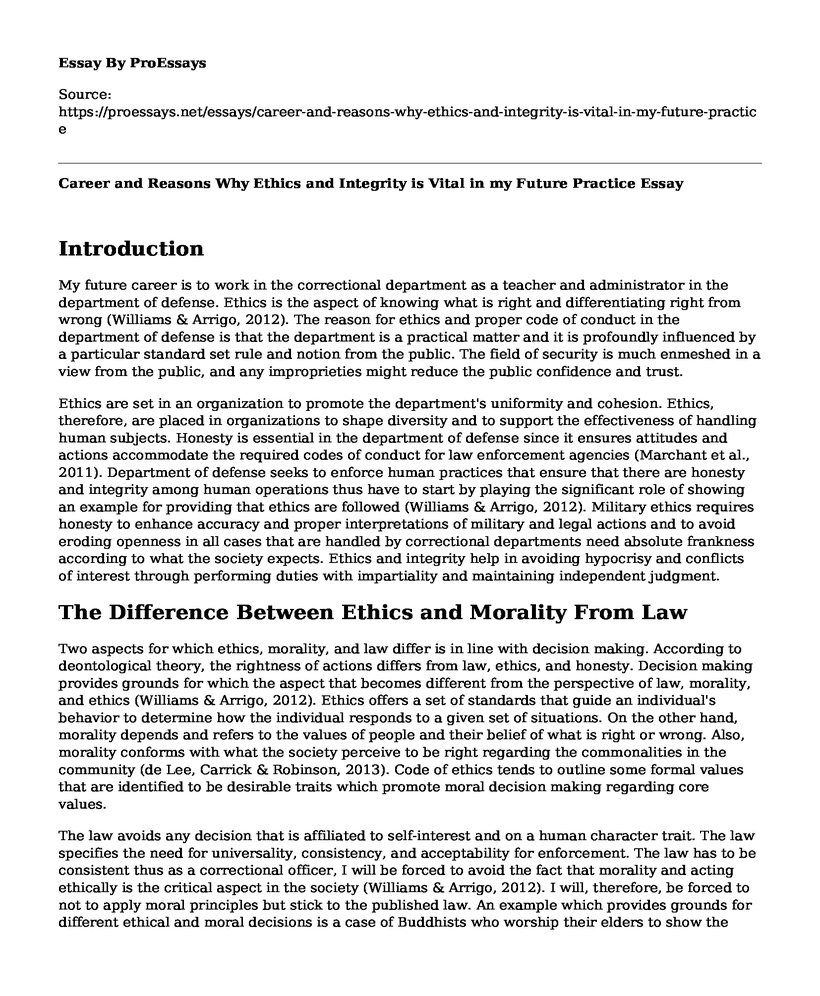Introduction
My future career is to work in the correctional department as a teacher and administrator in the department of defense. Ethics is the aspect of knowing what is right and differentiating right from wrong (Williams & Arrigo, 2012). The reason for ethics and proper code of conduct in the department of defense is that the department is a practical matter and it is profoundly influenced by a particular standard set rule and notion from the public. The field of security is much enmeshed in a view from the public, and any improprieties might reduce the public confidence and trust.
Ethics are set in an organization to promote the department's uniformity and cohesion. Ethics, therefore, are placed in organizations to shape diversity and to support the effectiveness of handling human subjects. Honesty is essential in the department of defense since it ensures attitudes and actions accommodate the required codes of conduct for law enforcement agencies (Marchant et al., 2011). Department of defense seeks to enforce human practices that ensure that there are honesty and integrity among human operations thus have to start by playing the significant role of showing an example for providing that ethics are followed (Williams & Arrigo, 2012). Military ethics requires honesty to enhance accuracy and proper interpretations of military and legal actions and to avoid eroding openness in all cases that are handled by correctional departments need absolute frankness according to what the society expects. Ethics and integrity help in avoiding hypocrisy and conflicts of interest through performing duties with impartiality and maintaining independent judgment.
The Difference Between Ethics and Morality From Law
Two aspects for which ethics, morality, and law differ is in line with decision making. According to deontological theory, the rightness of actions differs from law, ethics, and honesty. Decision making provides grounds for which the aspect that becomes different from the perspective of law, morality, and ethics (Williams & Arrigo, 2012). Ethics offers a set of standards that guide an individual's behavior to determine how the individual responds to a given set of situations. On the other hand, morality depends and refers to the values of people and their belief of what is right or wrong. Also, morality conforms with what the society perceive to be right regarding the commonalities in the community (de Lee, Carrick & Robinson, 2013). Code of ethics tends to outline some formal values that are identified to be desirable traits which promote moral decision making regarding core values.
The law avoids any decision that is affiliated to self-interest and on a human character trait. The law specifies the need for universality, consistency, and acceptability for enforcement. The law has to be consistent thus as a correctional officer, I will be forced to avoid the fact that morality and acting ethically is the critical aspect in the society (Williams & Arrigo, 2012). I will, therefore, be forced to not to apply moral principles but stick to the published law. An example which provides grounds for different ethical and moral decisions is a case of Buddhists who worship their elders to show the best of their respect for them. The outer world, worshiping elders may be found to be unethical.
Laws are different from ethics and morality since it is a published principle that is universal whereas ethics and morality depend on human beliefs and ways of viewing things. Disobedience of the law attracts a punishment while failing to conform to the principles of ethics does not call for punishment.
Code of Conduct Identified
The ethical and moral underpinnings regarding bribery are the most relevant codes regarding people's association with the community. Corruption "prevents others from receiving the required service" (Williams & Arrigo, 2012, p.35). "It is misconduct that prevents other people from sharing the benefits that they ought to receive at no cost" (Williams & Arrigo, 2012, p.35). Therefore, a precise definition of bribery should be made to safeguard the lives of all people in the society.
Secondly, solving ethical dilemma tends to face conflicting choices which might lead to the wrong verdict to individual's cases (Williams & Arrigo, 2012). The uncertainty of what is right or wrong provides grounds for higher forms of inequality in the law enforcement agencies. In Philadelphia, abuse of business and jobs occurs when there is bribery whenever business engage in unethical practices.
References
de Lee, N., Carrick, M. D., & Robinson, P. (Eds.). (2013). Ethics education in the military. Ashgate Publishing, Ltd..
Marchant, G. E., Allenby, B., Arkin, R. C., Barrett, E. T., Borenstein, J., Gaudet, L. M., ... & Silberman, J. (2011). International governance of autonomous military robots.
Williams, R. C. , & Arrigo, A. B. (2012). ETHICS, CRIME, AND CRIMINAL JUSTICE Pearson Education, Inc.
Cite this page
Career and Reasons Why Ethics and Integrity is Vital in my Future Practice. (2022, May 16). Retrieved from https://proessays.net/essays/career-and-reasons-why-ethics-and-integrity-is-vital-in-my-future-practice
If you are the original author of this essay and no longer wish to have it published on the ProEssays website, please click below to request its removal:
- Essay on Personal Career Strategy and Objectives
- Texas Legislature Sessions Essay
- The New Data From the Interview Responses HR Paper Example
- How Gamification Helps in Employee Selection Paper Example
- Essay Example on Pursuing Your Dream Career: The Role of Passion and Pragmatism
- Essay Example on Police Work: A Dangerous But Rewarding Career
- Feeling Unmotivated: My Story of Finding Employee Motivation - Essay Sample







